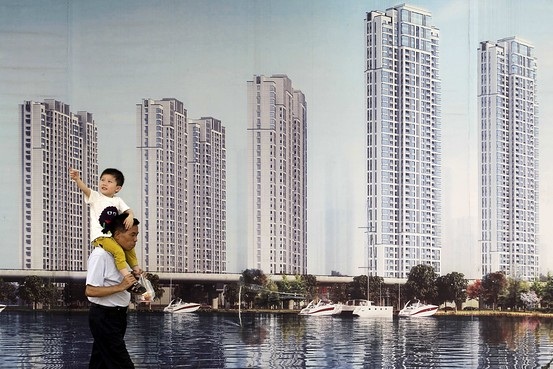
China's battered real-estate market appears to be turning around, strengthening an important pillar of growth and reducing the chances that China's slowing economy will stall in the second half of the year.
According to a survey of property developers and real-estate firms, the average price of housing in 100 major Chinese cities rose in June from May, after nine straight months of decline. The survey follows other signs that the Chinese market has bottomed out, including a pickup in real-estate investment in May and a far shallower decline in property sales during that month compared with April.
An improvement in China's property market would be important for the domestic and international economy. Real estate and property construction account for about 11% of the Chinese economy, according to GK Dragonomics, and about twice that share when accounting for other industries like appliances and furniture that are tied to real estate.
Internationally, steel, iron ore, copper and other commodities depend on the Chinese real-estate market for growth, as do construction-equipment makers in the U.S. and Europe.
"The worst-case scenarios [about Chinese growth] have been built around a collapsing property market," said Mark Williams, Asia economist for Capital Economics in London. "If the market isn't collapsing and is rebounding, the future looks a lot brighter."
The average price of housing in June rose 0.05% to 8,688 yuan ($1,368) per square meter, according to data released on Monday by China Real Estate Index System, which tracks property prices.
Although housing prices declined in 55 of the cities tracked, compared with 45 where they increased, some of the largest increases came in some of China's biggest cities. In Beijing, prices rose 2.29% in June from a month ago, while in Shanghai the increase was 0.65%; in Shenzhen, prices rose 0.8% from a month earlier. The largest monthly decline tracked, 3.87%, was in Zhangjiagang, a city of 1.3 million in eastern China.
In Beijing, housing sales also rose 10.5% in June, to 25,602 units, Xinhua news agency reported on Monday. That is a 50.6% increase from a year earlier.
Separately, Standard Chartered recently reported that the slide in real-estate sales moderated in the second quarter of 2012, while sales of apartments in China's largest cities have started to increase.
Two years of declining prices have made apartments more affordable to ordinary Chinese, while an interest-rate cut in June has reduced mortgage costs. China's highly publicized effort to boost growth also may have encouraged buyers to believe that prices may be headed up.
Florrie Tang, who bought an apartment in a Shanghai suburb in June, said she had been searching for a place since March and felt that prices had fallen close to the bottom of the market. She said she figures the apartment is a good hedge against inflation, though the 27-year-old design-company manager said she didn't believe property prices would increase at the pace they once did. In major cities, prices nearly doubled from 2006 to 2010.
Cher Cai, assistant president at Shimao Property Holdings, a property developer in Shanghai, said that "as the property market warms up, we will definitely be more aggressive in launching projects and speeding up construction."
Since 2010, the Chinese government has tried to deflate what had become a housing bubble without battering the Chinese economy. The campaign was aimed primarily at the high end of the real-estate market by making it much more difficult to speculate in real estate by buying multiple apartments. The government raised down payments for second homes to 60%—twice as high as for first homes—among other measures.
To prevent the real-estate market from crashing, China also started a massive public-housing program aimed at lower-income workers. While that program is riddled with problems, ranging from phony reporting to substandard construction, it appears to have put a floor under the real-estate market, analysts say.
Even so, the drooping real-estate market, combined with declining demand for Chinese exports in Europe and elsewhere, pulled back China's economy to an 8.1% pace in the first quarter of 2012, the slowest growth since the spring of 2009, when the world was in recession. The economy is widely expected to slow further, to roughly 7.5% in the second quarter. That has prompted Beijing to focus more on growth, easing monetary policy and approving a number of investment projects.
A pickup in the real-estate market should help China to grow more rapidly in the second half of the year on a quarter-to-quarter basis, said UBS economist Wang Tao. But Standard Chartered economist Stephen Green said that most of the gains aren't likely until next year because developers have such a large supply of unsold homes.
Mr. Williams, the Capital Economics economist, said there is an outside chance that sales and prices could shoot up, as consumers become more convinced that real estate is once again a smart investment. That would be too much of a good thing, though, he said. Another big rise in real-estate prices would likely end in a crash.
To avoid such an outcome, Beijing has been wary of easing property restrictions too much. The government has allowed, on a city-by-city basis, some breaks for first-time buyers. The cities of Chongqing, Wuhan and Zhengzhou, for instance, have allowed first-home buyers to borrow more from government-sponsored savings funds. Banks are also permitted to discount mortgage rates up to 30% for first-time buyers.
But restrictions remain in place for those buying second properties. In Beijing, a scientist waiting to register a property she bought for her parents said that even though interest rates have dropped, she had to pay a premium on her mortgage.